
San Francisco’s aptly named Division Street, which dead ends in the city’s famous tech development district, serves as a metaphor for the disparity between the wealthy few and the expendable many, both in the U.S.A and the wider world. The project is a story of lives lived on hard streets, amidst staggering wealth and empty promises, told through photographs, interviews, newspaper headlines, overhead street conversations, found text and first-person narratives, a long way from the beautiful ‘city by the bay’ conjured up in the popular imagination.
“Be careful who you pretend to be, you might forget who you are.”
“We should Believe in ordinary Acts of Bravery, in the Courage that drives One Person To Stand Up For ANOTHER!”
– Freeway column messages
Division and Bryant, 6 August 2017
Homelessness and community on
Division Street
ROBERT GUMPERT
DEWI LEWIS PUBLISHING
“It’s your business when your neighbor’s wall is in flames.”
“The more corrupt the state, the more numerous its laws.”
“Ask any Mexican, any Puerto Rican, any black man, any poor person – ask the wretched how they fare in the halls of justice, and then you will know, not whether or not the country is just, but whether or not it has any love for justice.”

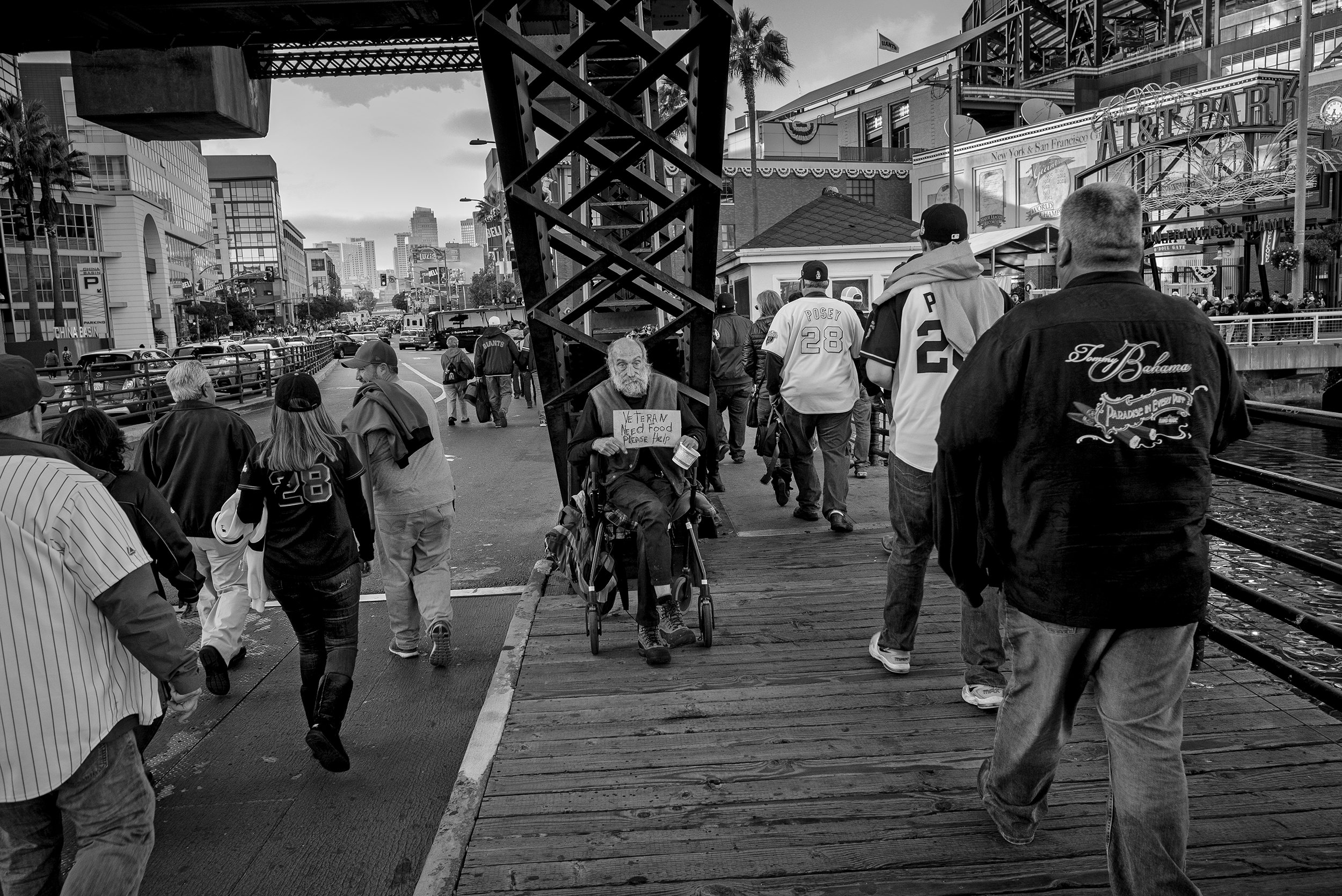
San Francisco Giants baseball fans cross the “Lefty O’Doul Bridge” on way to the ballpark. 10 October 2016.

Cardboard and wooden lattice house, 16th Street near Potrero, San Francisco. 7 August 2016.
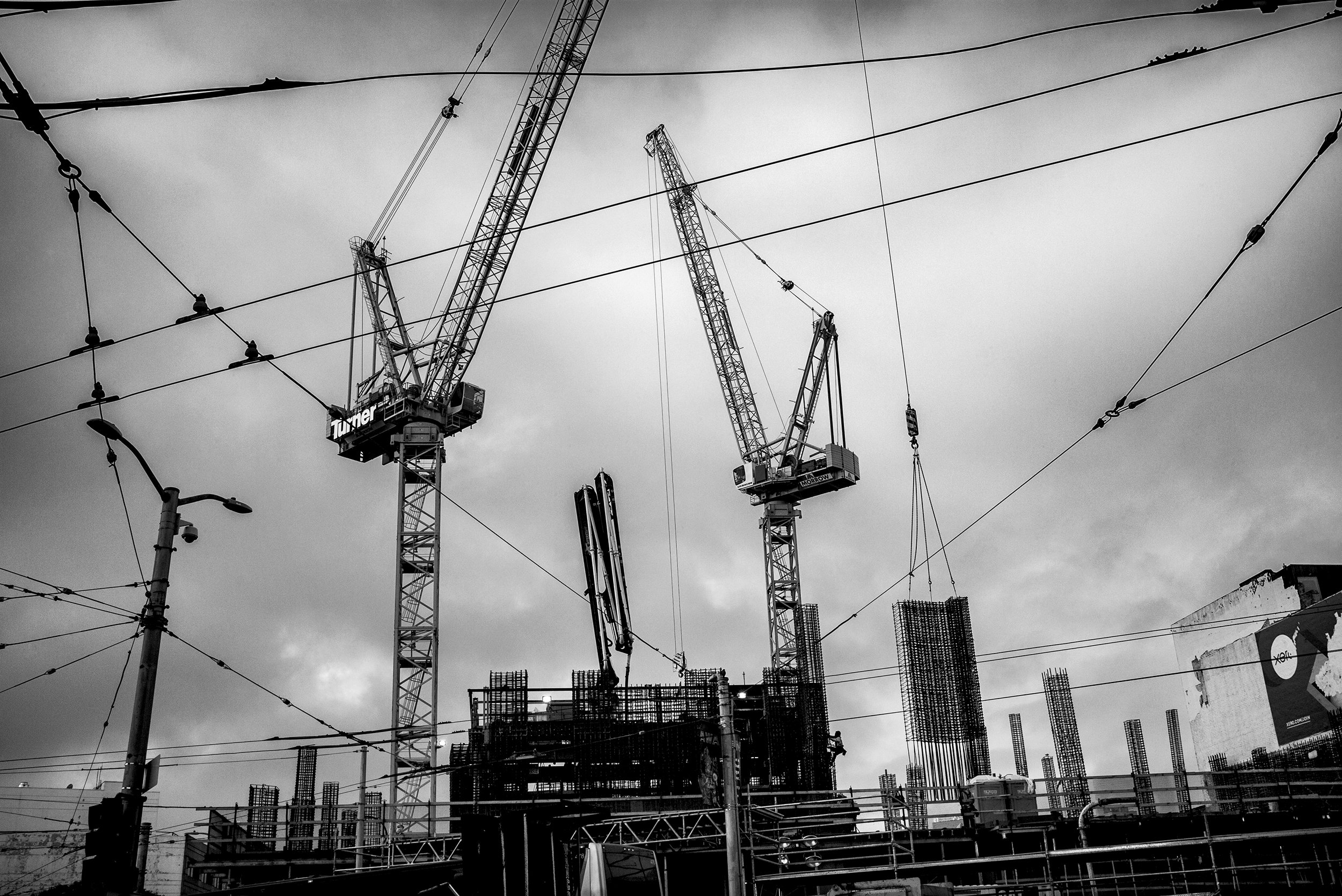
Construction of a 27-story, 250 feet residential tower and commercial space building at Otis and 12th Street, San Francisco. 22 January 2020.

New condos at Spear and Folsom. Costs: just under $900,000 for a “junior one-bedroom” to more than $3 million for a three-bedroom, upper-floor unit. 5 October 2019.
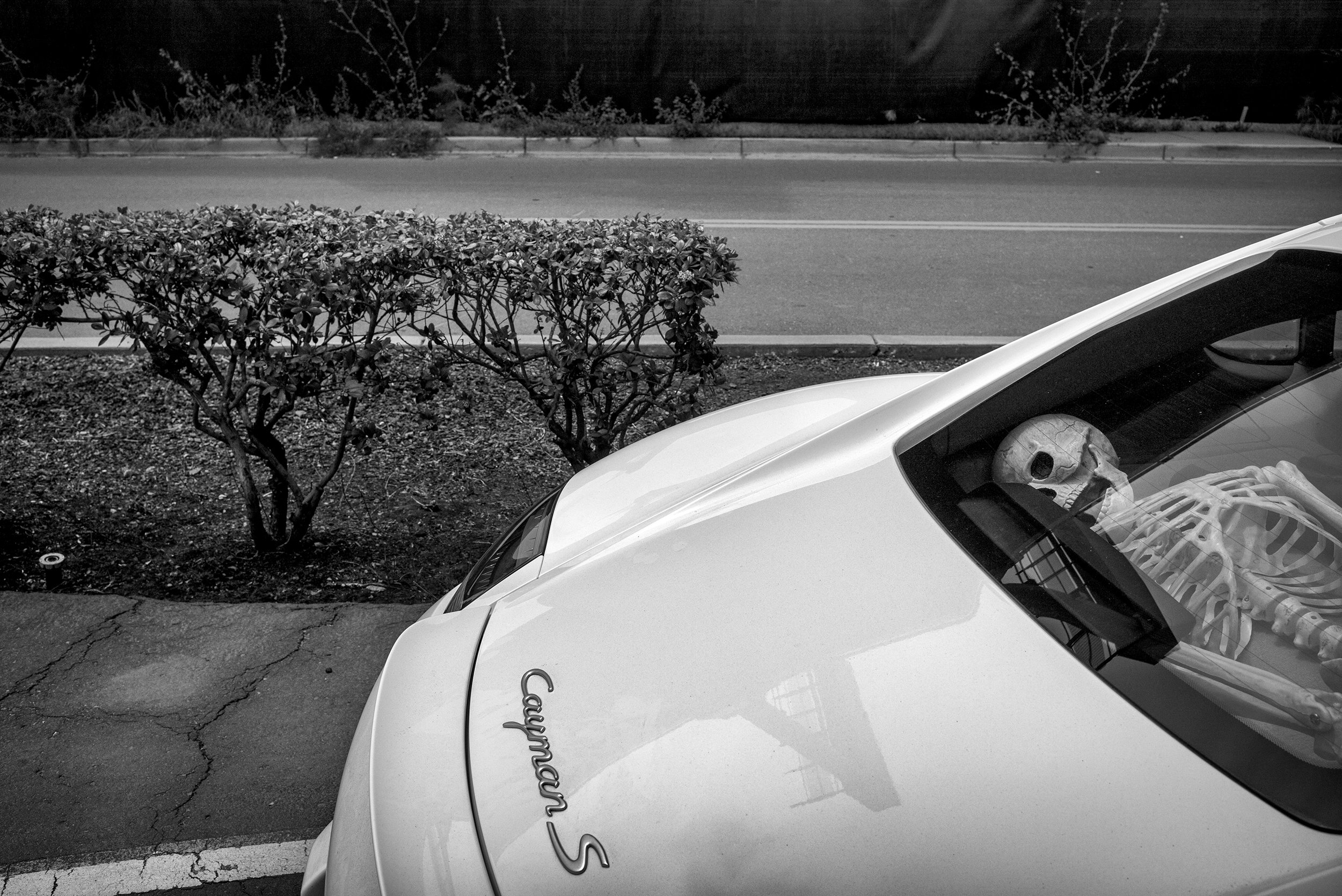
Staff parking lot UCSF Orthopedics building, San Francisco, CA. 25 May 2016.

Tent encampment, Division (13th Street) at Harrison. 16 February 2016, San Francisco.
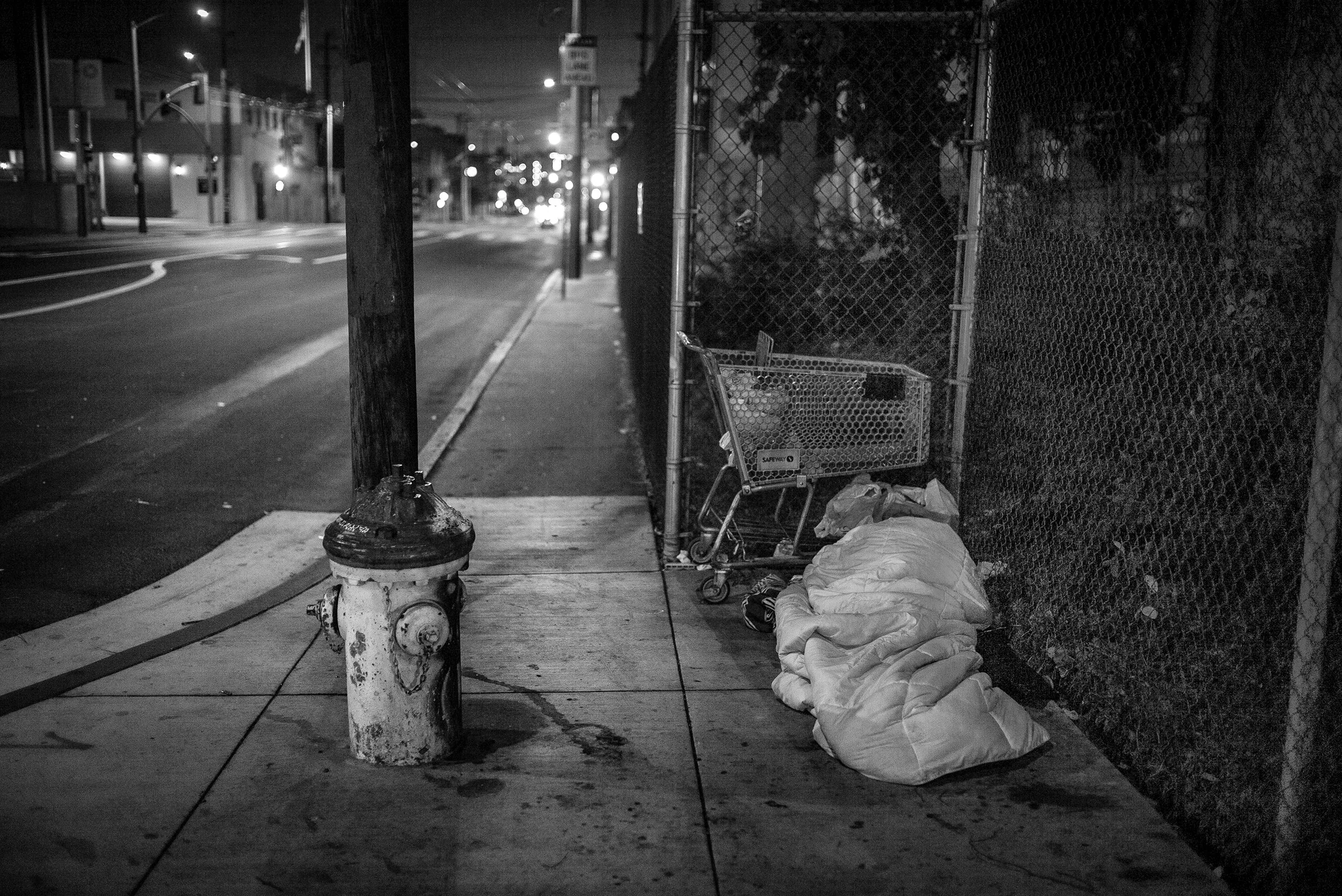
Sleeping rough, 16th and Utah. 9 November 2020, San Francisco.
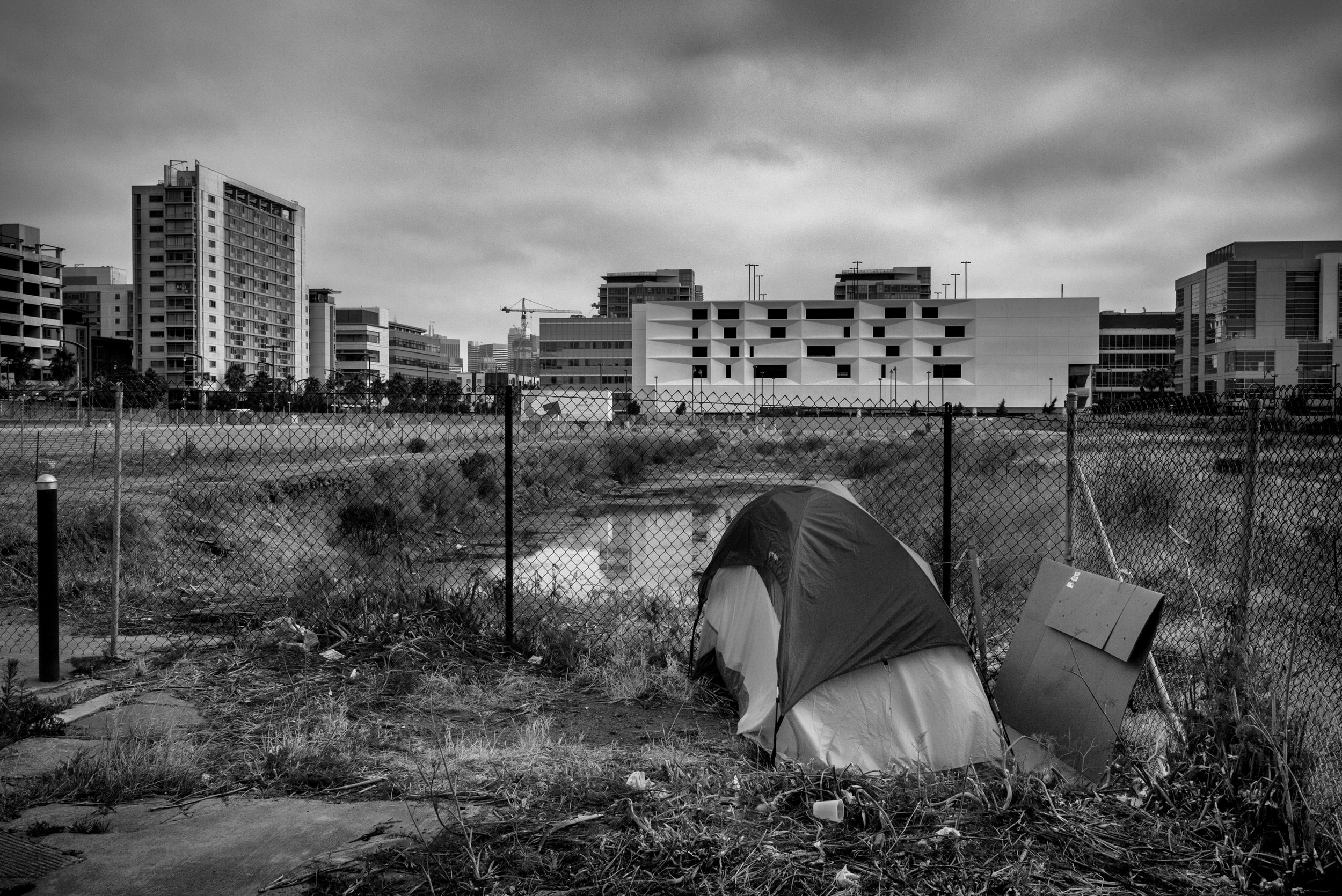
16th and Illinois, Site of SF Warrior’s basketball coliseum. 3 July 2016.

16th and Illinois, Site of SF Warrior’s basketball coliseum. 27 May 2017.
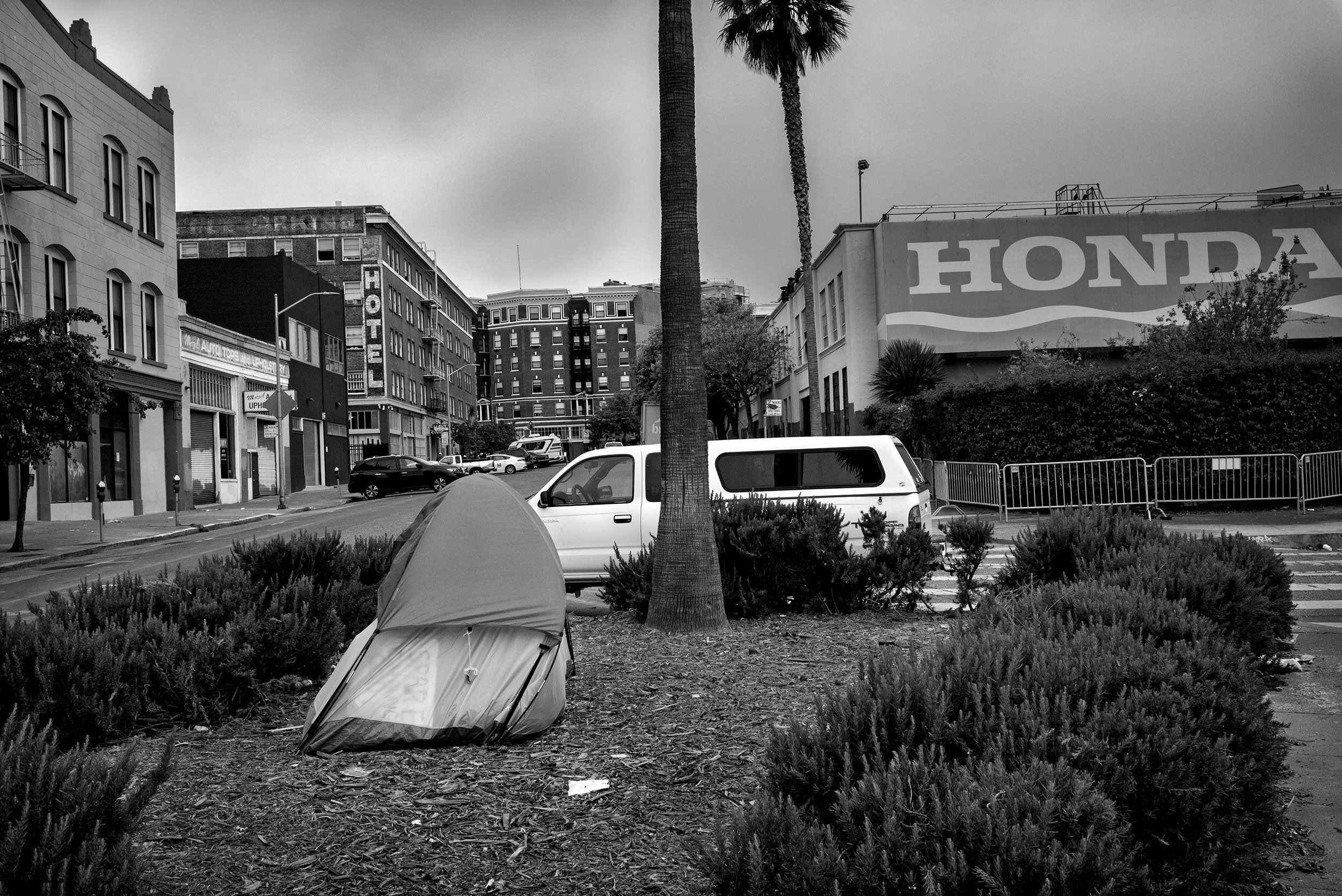
Corner of 12th, South Van Ness and Mission Streets. 18 July 2018.

Corner of 12th, South Van Ness and Mission Streets. 27 May 2019.
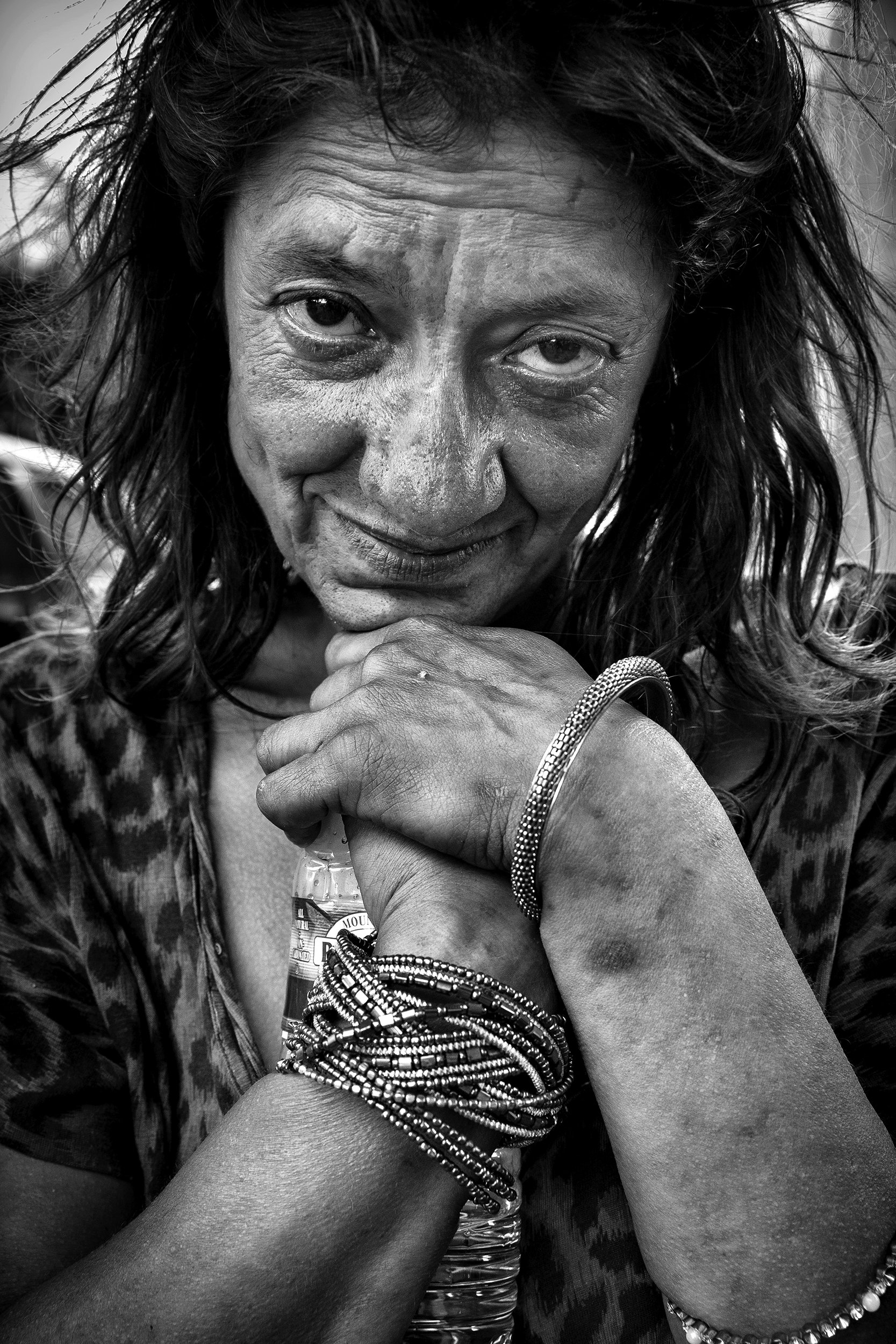
Helia Silva, once from Boston. Brannon Street near 8th. 25 June 2015.

Destiny Vargas at her tent 13th Street and S. Van Ness. 21 February 2016.

Kasper Greene, 39 years old, homeless for about 1.5 years with Grace Roberts, 28 years old, homeless for about a year, in their tent on Florida at Division. 13 September 2016.

Andrew D’Amore, center and anonymous visit Curtis Smith, left, at Curtis’s box home, Indiana, and Caesar Chavez. 4 May 2017.

Tent on Rincon and I80 eastbound. 15 June 2010.

A Division Street and San Bruno encampment. 14 February 2016.
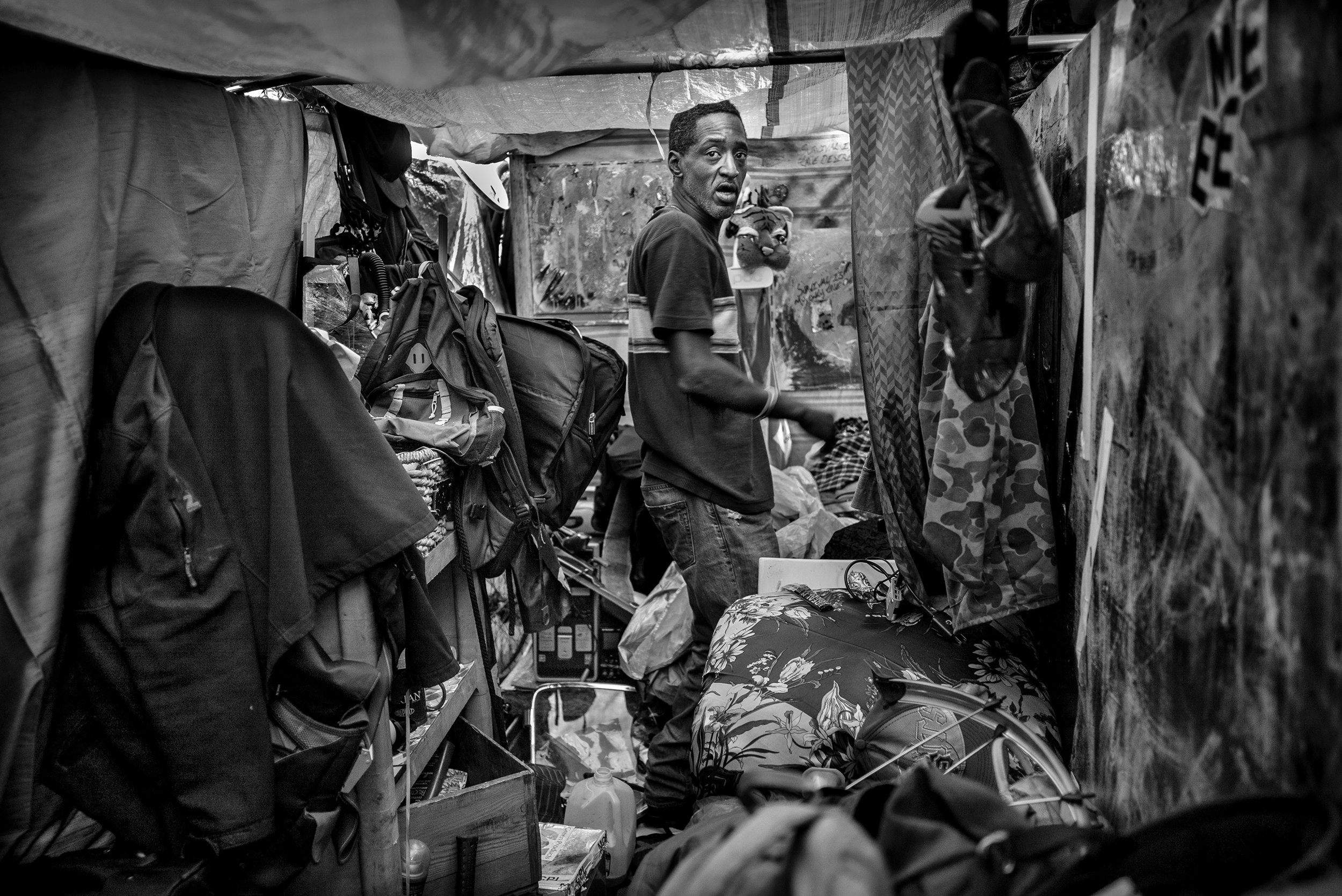
Corey Trosclair at a Division Street and San Bruno encampment 16 February 2016.

Sleeping rough on Polk at Hays, one block from City Hall. 20 February 2017.

Sleeping rough on the earthquake footing of the freeway support at San Bruno and Division. 15 January 2018.
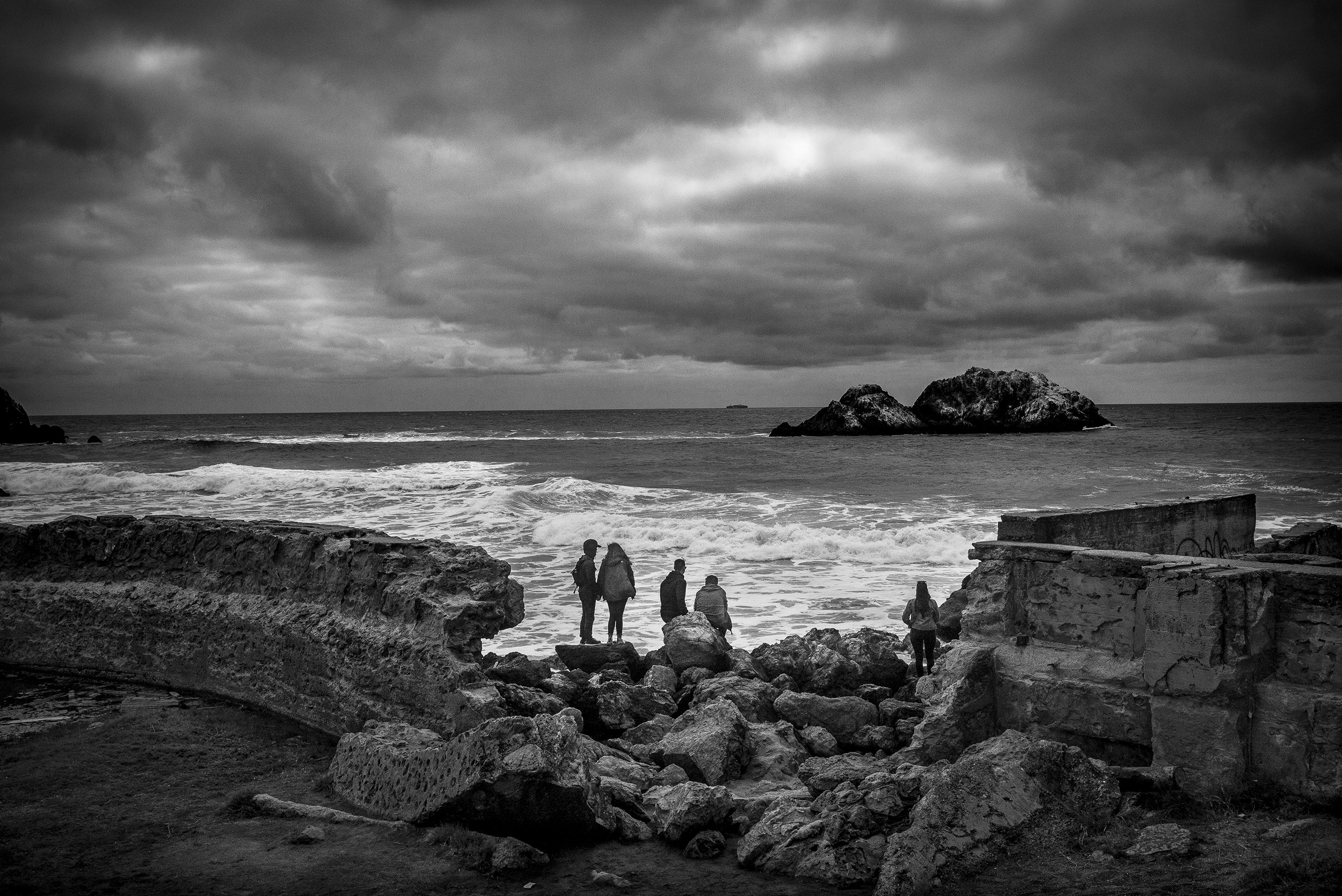
Watching the surf roll in at Sutro Baths. 5 May 2019.

An encampment at San Bruno and Division. 23 September 2019.

U.S. Navy Blue Angeles fly over downtown San Francisco during “Fleet Week”. 10 October 2019.
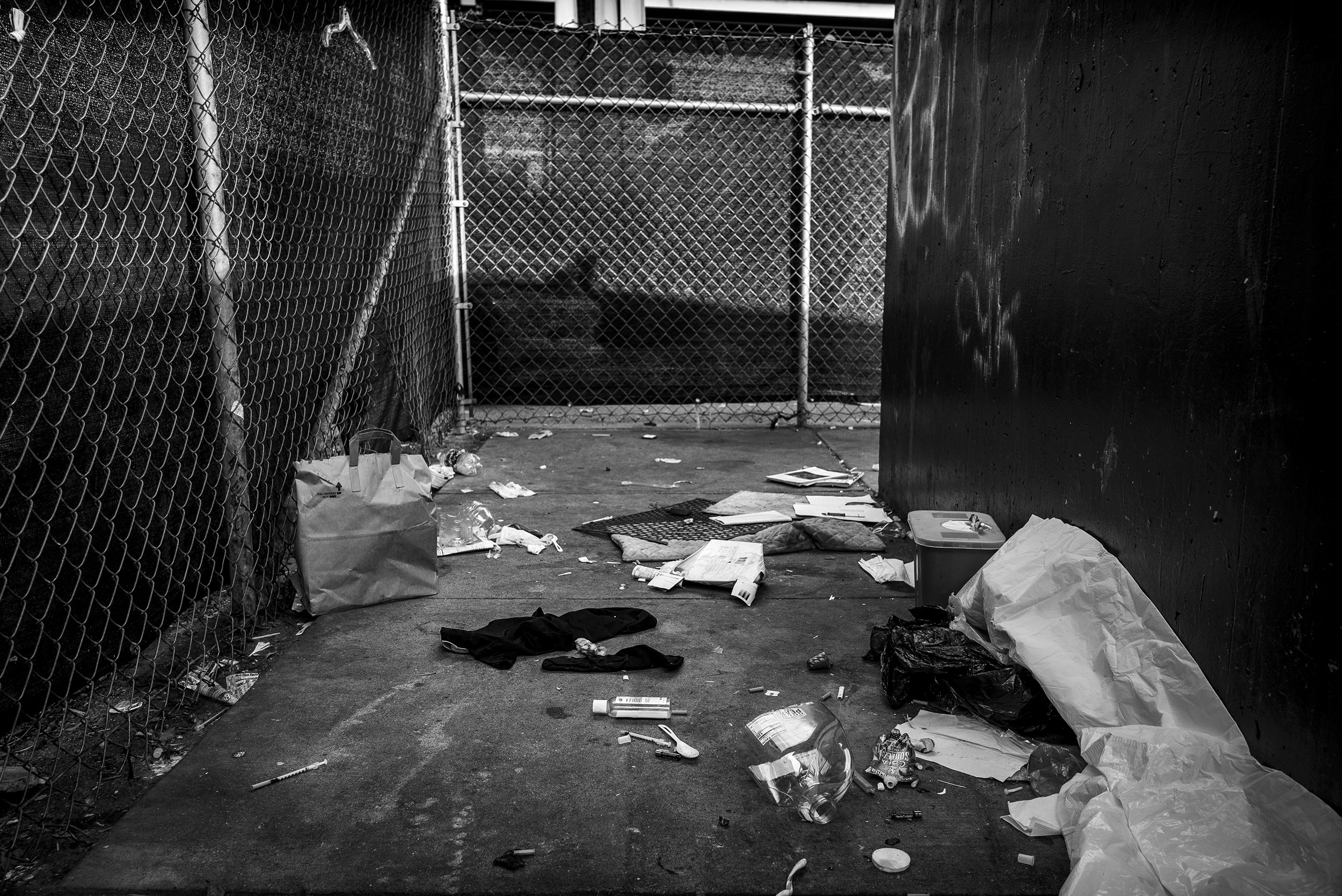
After a city “resolution” sweep of a Division Street and San Bruno encampment. 13 November 2019.

After a city “resolution” sweep of an encampment, Division Street and San Bruno. 13 November 2019.

Running along the “Great Highway”, at the beach. The highway was closed to vehicles during the pandemic. 10 October 2020.

A Division Street and San Bruno encampment during the pandemic. 14 November 2020.
Tap/hover over image for text…

Name: Lakrisha Harper, 38
Without a home: 5 years
Place: A parking lot on Merlin, under the freeway
Date: 23 April 2021
“(The most difficult thing about being out here?) Maintaining. That’s what it is. It’s hard out here, like as far as showers and food and, security.”
“(Living as a single woman you) got to be self-sufficient and take care of myself, nobody else to do it for me. We’re kind a like segregated down here. We got people at one end and thenthere’s people at the opposite end, we kind a stay to ourselves.”
“(I miss being with my kids.) Yeah, it sucks. Once I get my housing back my kids will be home but it’s hard. Stuff is like irritating. COVID hit and then everything just came to a halt. So now I got to wait.”
“(Help from the city?) No, not really, not at all. They leave us here to fend for ourselves with no resources at all. The only time we do get resources is when we raise hell and cause problems for them.”

Name: Jula Perez, 42; James Jeffrey Perez Brown, 5 mths; Elijah Perez Brown, 2
Without a home: A long time
Place: Compass Family Services
Date: 18 December 2019
How long without a home? “You know I don’t know. It’s been going on for a long time. That’s a complicated question. I was in the shelter a couple weeks, at the moment I’m in a transitional situation. Right now my apartment has mold in it and it’s not good for the babies. I’m dealing with the issues with my landlord but it’s not safe for them so I’m kind of like surfing couches. You think the situation’s fixed, and they’re just patching over the leaks, but there’s mold in the walls. With the babies that’s the hardest. I can’t get emotional because this little guy sees and hears everything. My disposition is very important to his behavior so I try to keep a straight face as much as I can.”
“Hardest thing is having children. Having to explain to my son certain things, why we have to do things especially like being in a shelter they make you leave at a certain point, the light being on, the sounds … The hardest part is not being comfortable - is not having a place of comfort. It’s very dehumanizing. There’s a stigmatizing to it, especially in this city where people are walking over people lying on the street as they’re on their iPhones. One thing I say to my older son, if someone is just lying in the street you make sure that they’re OK. Here I think that’s kind of forgotten. You walk over people, you don’t know if they’re dead, but you don’t care. You don’t even see them; you have like these blockers on. It’s like that dehumanizing thing (but) we’re all the same. If I was lying on the ground, I would hope somebody would check to see if I’m OK.”
“It’s very difficult because the shelters put you out at a certain time, you have to be in by 5 and out by 7, depending on the day. But when I have children they need a nap, it’s very difficult to find respite on the street.”
“We’re all human, we all go through rough times. I tell my son the world is your home. Not these little boxes, these four walls. For me anywhere I’m at is my home. This is our birthright. This is our inheritance and we all share it. There is no way any of us should be without, with as many resources as we have. The unequal distribution of it has gotten out of control.”

Name: Ashanti Jones, 44
Without a home: “I’ve been on the streets all my life”
Place: Parking lot between Merlin and Oak Grove
Date: 29 April 2021
Ashanti, a musician/artist, has been on the lot for 6 months but will have to move by 17 May. He doesn’t know where.
(The hardest thing is) “the harassment, social indifference. The way that people, the authorities, address you. They act like it’s my fault. I’m pretty sure, myself and a lot of these people, if the resources were available, we would take them. (But )not no hotel room for a couple months and then kick us back out on the street to do this whole recycle thing again because it generates currency. They’re getting paid off peoples’ misery.
“They moved us out of this alley and told us to pack up, that they were sending out resources. That they were going to put us in hotel rooms. We packed well into the night and no one came, and so I said let’s go in this parking lot. People still park their cars here; we don’t allow peoples’ cars to get broken into. People call the cops on us because they feel some type of social righteousness, that we’re doing something wrong. If social indifference continues to happen, they’re going to feel they can do whatever they want to us and not have to worry about any type of repercussions. I don’t understand how that’s right. If you’re moving us off the streets then that means that San Francisco has an obligation to house its citizens, and not just place them in hotels, rundown hotels. These are the homeless people that they take off the streets from a bad situation and put them into a worser one. It’s all designed so that you can be kicked out. San Francisco, they’re not addressing the homeless crisis that’s happening out here in the wealthiest city in the United States of America, and I don’t understand what’s going on. They’re moving (us) and they’re using fear of incarceration to intimidate because people are on parole and that’s not right. You’re taking a hopeless person in a desperate situations; you’re provoking them to have some sort of negative episode. It’s going to drive people insane. What do they think going to happen? Now you provoke this situation and everybody’s watching. Not just Americans but other people in other countries are watching America, “home of the brave land of the free”. It don’t feel very free, don’t feel very free at all.
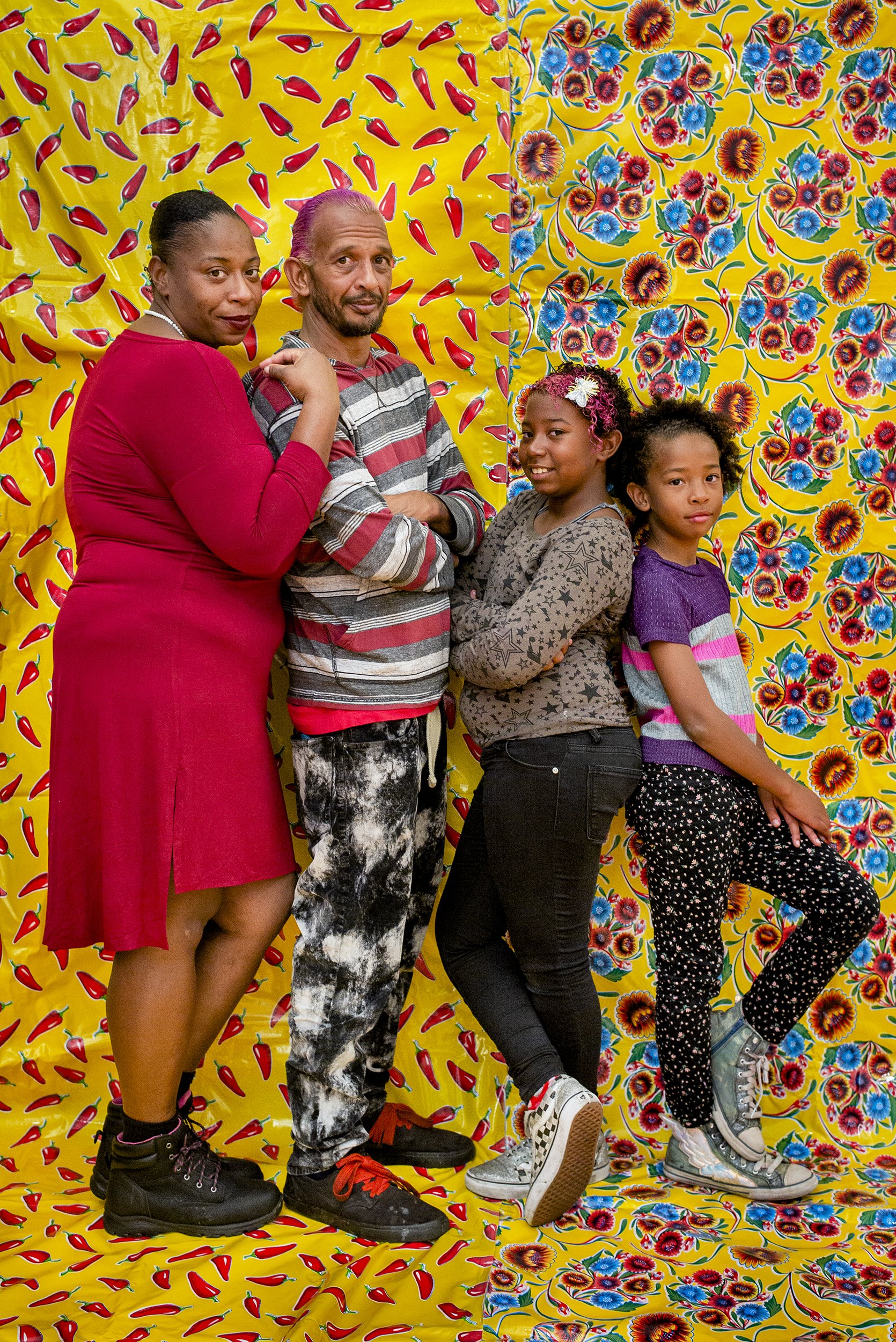
Name: Dynasty Toney, 36; JR, 45; Baltimore, 10; and Divine, 8
Without a home: About 5 years
Date: 21 October 2019
Place: Compass Family Services
What’s your typical day like?
Destiny: “A typical day would be we wakeup in the morning, like 6 in the morning, from the shelter. We get the girls ready for school. We have business for about 3 hour, and then we go relax before I have to go to work, ‘cause I work from 3 to 11.”
JR: Like she said, wake up, get our daughters ready for school. Take them to school as a family and then whatever business we have throughout the day; whether it’s coming to a Compass meeting, or a housing workshop, or looking at an apartment ‘tell about 1 o’clock. Then she’s gets ready for work, she goes to work, I pickup the girls from school and go back to the shelter around 7. But then we have to wake up at 11 and go pickup mom from work, so I have to get the girls up and rustle them to the car, go pickup mom, and then come back to the shelter. If we had a place they are almost at the age that we could leave them and I could run and pickup mom and they’d be OK for 30 minutes. But you couldn’t do that at the shelter.”
Destiny: “You do have to worry about your (shelter) slot being taken although since we’ve been there, which hasn’t been that long, we haven’t run into that problem just yet. But it is something we got to keep in mind because some nights they are full and it’s scary.”
JR: “We’re kind of fortunate because we have two vehicles. One of them we use as storage and that’s pretty much where all our stuff is. We just have a bag of cloths for the girls to get dressed and go to school with, and a bag of dirty laundry.”
Would life be much easier if you had a place?
Destiny: “Yes. In so many ways. I feel like I would be fulfilling my obligation as a mother to my daughters. We would have a place to cook, to feel clean, take a shower, a bath. The girls could have some friends over. We can do things together; play games. From there we would be able to get them more involved in things they want to do. One of them wants to do some kind of dancing or soccer, and things just go on from there. We would start living life normally. I’ll be able to cook for my family. The girls could have a party for their birthday. I would have a place to call home, somewhere to work from so that we can better our lives from there.”
JR: “It’d be easier because I wouldn’t have to worry about where the girls are going to shower everyday. I’m kind of protective like that so I wouldn’t have to worry about the bathrooms situation because they got to get up at night in the shelter to go to the bathroom. I’d like them to have their own doors to close, you know.”

Name: Tony Ballew-Ruiz, 41
Without a home: 7 years
Date: 23 June 2021
Place: Florida Street near Division
”I don’t mind the fights as much as being woken-up by a cop and then having my name ran for warrants. If I was inside a house that would never happen. I could have a warrant for ten years and nobody would ever know. That warrant could be just for missing a court date, but if I’m on the streets I’m always talking to a cop. We’re getting cops called on us all the time. We’re in other people’s space. They don’t understand that we don’t want to be in their way, we’re just looking for a space to exist. We’re just looking for a place to be. We try and find these spots that are out of the way, try and find areas that people don’t frequent.”

Name: Peter Marshall Qualls, 47
Without a home: “I’ve been without a place since I was ten and half years old”
Date: 10 February 2019
Place: San Bruno Avenue between 15th and Alameda
“Home means a place where people come together and work in partnership to share their experiences and hopes with other people in the community so that financial brackets that each of them are a part of don’t over burden them or cause people to be extremely poor. So, we share time together and trust one another and in turn give each other security and hope.”

Name: Sally Conn, 36; Jeremiah Conn, 41; Dawson Conn, 2
Date: 13 December 2018
Place: Compass
Without a home: 3 months
What does home mean?
Sally: It makes me cry. Home means to me a family, where we’re together and don’t have to move around all the time. Home is the place where me, my husband, my baby can relax, be together, have dinner together.
Jeremiah: To be honest with you shelter and home, as long as your family is together that is home. Wherever you lay your head down, that is home to me as long as our family is together.
The hardest thing
Jeremiah: Being on the streets and seeing what’s going on in real life and having my son susceptible to that every day. Him growing up around it instead of being in home where we can teach him, we can’t teach him outside.
Sally: Hardest thing is being outside all the time where the baby sees all this bad (stuff) that happens outside and you know you’re not able to go somewhere where you know you’re safe, where your baby won’t get hurt.
Jeremiah: I see how other families are having to struggle to and it does affect me because I see what is going on compared to people that have homes and have everything they need. They don’t see what we (those without a place) have to struggle and go through.
Sally: I see a lot of good people but I see more bad people. I see how they treat each other. When I came here, I thought it would be a good place for us but it’s not. It’s not a really good place and it’s affected me a lot.